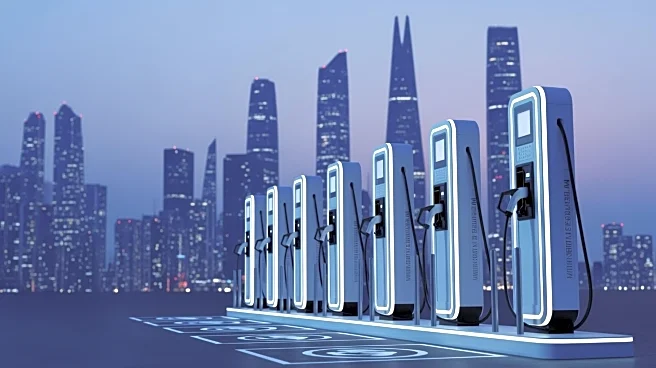What's Happening?
Rivian Automotive, an electric vehicle manufacturer, has seen its stock price plummet by over 80% from its all-time high. The company went public in November 2021 with an IPO price of $78 per share, but its shares now trade at approximately $13. Rivian's
initial success was fueled by backing from Amazon and Ford, mass production of its first vehicles, and a buying frenzy around hypergrowth stocks. However, supply chain issues, a challenging macroeconomic environment, and increased competition have hindered its progress. Rivian currently produces three types of EVs: the R1T pickup truck, the R1S SUV, and electric delivery vans for Amazon. Despite doubling its production in 2023, Rivian's growth has slowed, and it expects to deliver fewer vehicles this year.
Why It's Important?
Rivian's stock decline underscores the volatility and challenges faced by new entrants in the electric vehicle market. The company's struggles with supply chain constraints, factory shutdowns, and competition highlight the difficulties in scaling production and maintaining investor confidence. Rivian's situation reflects broader industry trends, where rising interest rates, inflation, and reduced EV subsidies have dampened consumer demand. The company's reliance on Amazon's long-term order for electric delivery vans provides some stability, but its future growth depends on overcoming production hurdles and launching new models like the R2 SUV. Rivian's experience serves as a cautionary tale for investors and other EV startups navigating a rapidly evolving market.
What's Next?
Rivian plans to launch its lower-priced R2 SUV in 2026, which could be pivotal for its future success. Analysts expect Rivian's revenue to rise by 32% in 2026, driven by the R2's rollout and a joint venture with Volkswagen for new EV architecture. The company aims to scale production at its new Georgia plant, potentially tripling its manufacturing capacity by 2028. Investors will be closely monitoring Rivian's ability to execute these plans and improve its financial performance. Positive developments could boost Rivian's stock valuations, but the company must navigate economic pressures and competitive dynamics to achieve long-term growth.
Beyond the Headlines
Rivian's journey highlights the ethical and environmental considerations of the EV industry. As companies strive to meet production targets, they must balance sustainability with profitability. Rivian's focus on reducing dependence on third-party suppliers and improving factory efficiency aligns with broader efforts to minimize environmental impact. Additionally, the company's partnership with Volkswagen for EV development raises questions about collaboration and competition in the industry. Rivian's experience may influence regulatory discussions on EV subsidies and market dynamics, shaping the future of electric mobility.
















